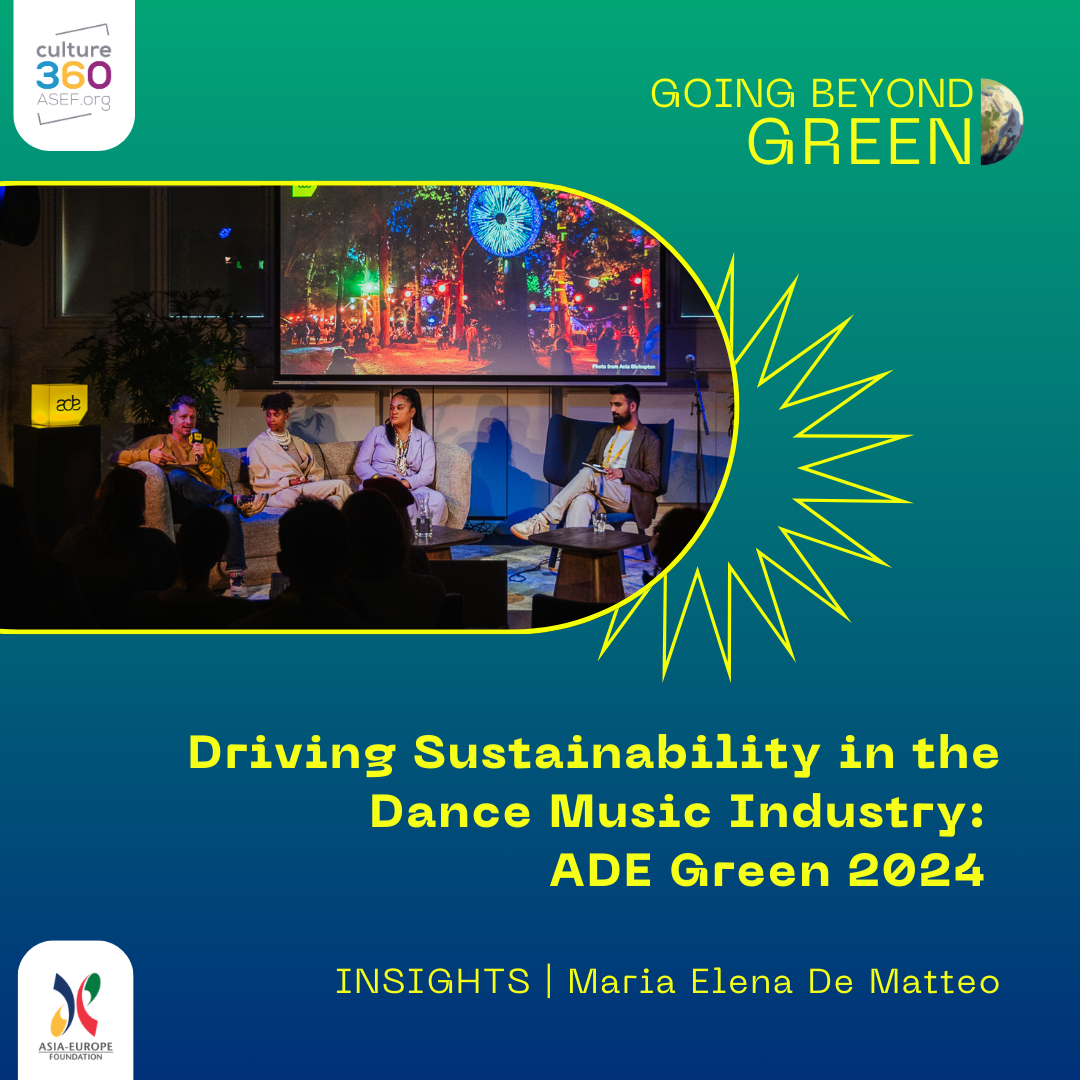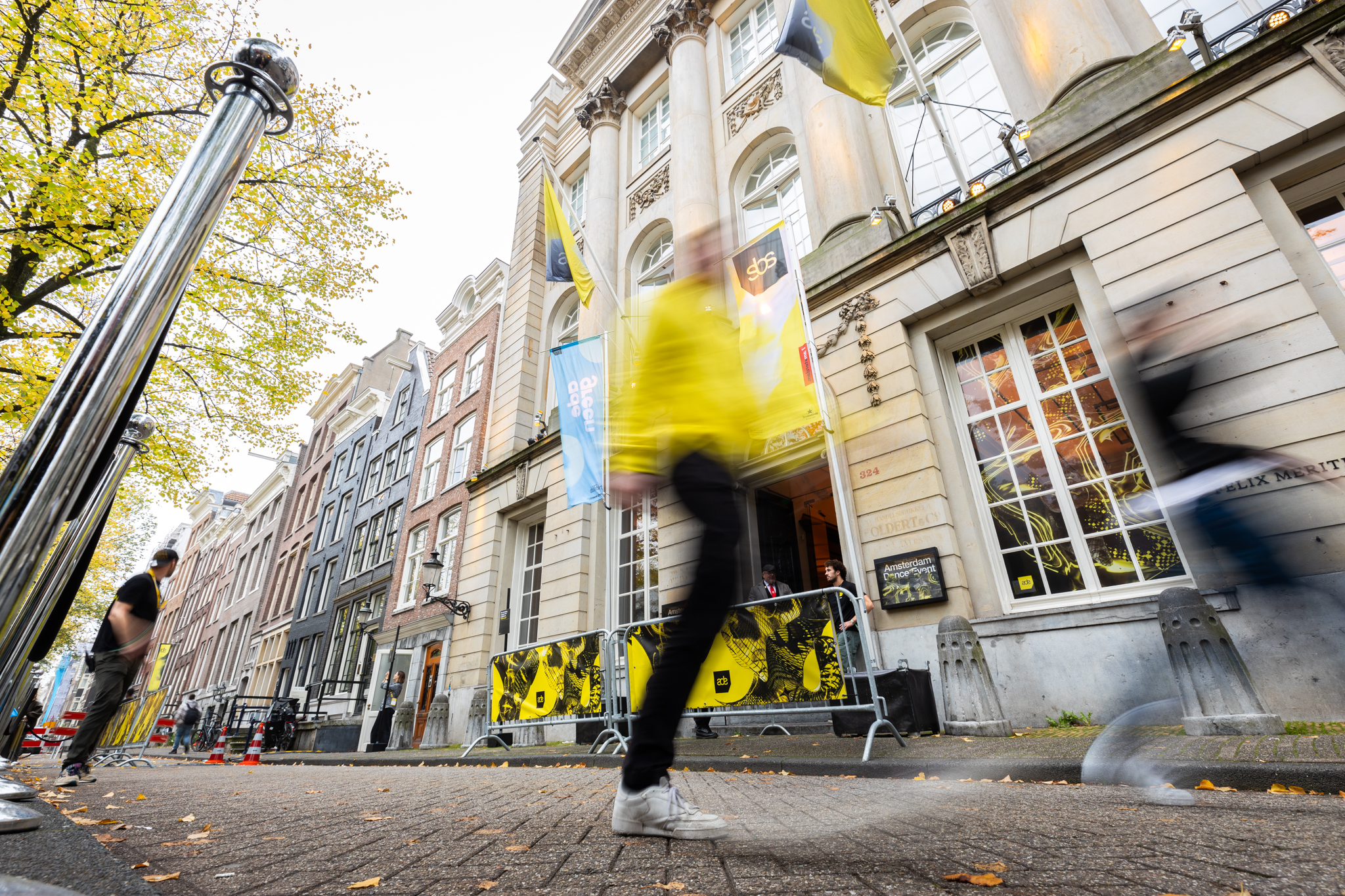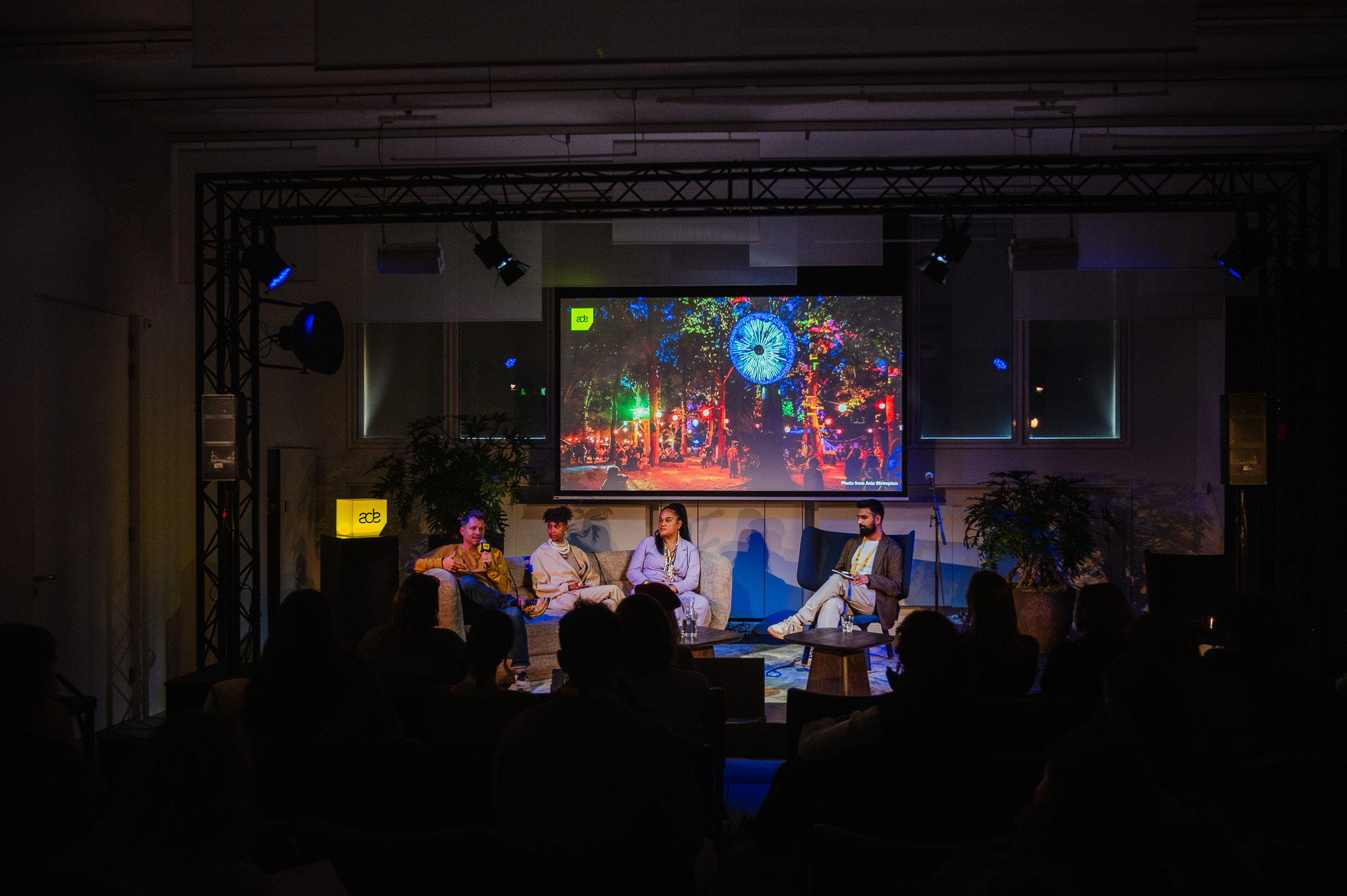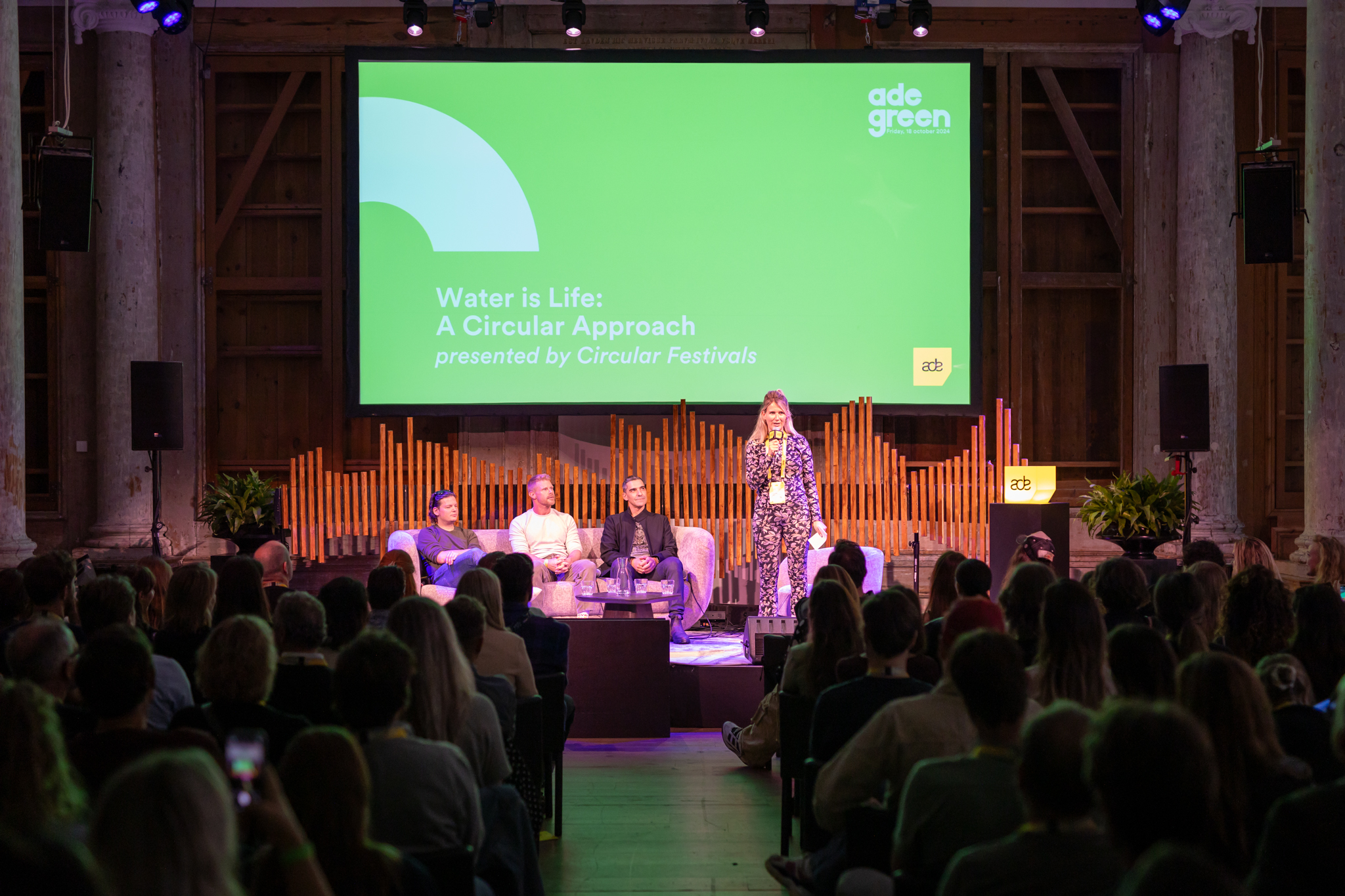Driving Sustainability in the Dance Music Industry: ADE Green 2024

Sharing key insights and practical takeaways from its most recent edition, Maria Elena De Matteo takes us to ADE Green 2024, a core initiative of the Amsterdam Dance Event (ADE) that fosters dialogues on eco-conscious approaches in music and cultural event productions. Explore how this festival plays a pivotal role in building the dance music industry's commitment to environmental impact, inspiring collective action for sustainability in the Netherlands and globally.
This article is commissioned as part of culture360.ASEF.org's Going beyond 'green' open call. Through a series of articles and podcasts, we look at various endeavours, insights and trends that broaden the discourse of sustainability beyond the environmental aspect within the arts and culture sector.
As the global electronic music community converges each year in Amsterdam, one initiative stands out for its commitment to environmental impact: ADE Green. A pivotal part of the Amsterdam Dance Event (ADE), the world's leading electronic music festival, ADE Green has emerged as a key platform for discussing sustainability within the music industry. By bringing together artists, industry professionals, and innovators, it is not only redefining how festivals and events operate but also challenging broader cultural and social landscapes to align with a more sustainable future.
The Emergence of ADE Green
Launched in 2013, ADE Green serves as a focal point for discussions, workshops, and initiatives that address the urgent need for sustainability in the music industry. The event brings together key players across the sector to share insights, brainstorm solutions, and take concrete steps toward reducing the ecological footprint of live music events. This reflects a growing awareness of the environmental impact of large-scale festivals and concerts and the need to take responsibility for the planet's future.
The goal of ADE Green is not only to foster dialogue but also to inspire action, ensuring that environmental considerations are integrated into every stage of music event planning, from conception to execution.
1. The entrance to ADE Green at Felix Meritis, where sustainability and innovation in the music industry take centre stage. © Roeland Hoefsloot
Key Insights from ADE Green 2024
The 2024 edition, held in October 2024, presented essential insights into how the electronic music industry can integrate sustainability and climate justice into its practices. The key messages from the event continue to resonate, offering actionable takeaways for anyone involved in music and cultural event production:
1. The Intersection of Climate and Social Justice
A central theme at ADE Green 2024 was the understanding that climate justice is not just about reducing emissions but also about addressing social and cultural inequalities exacerbated by climate change. Marginalised communities, including Indigenous peoples and the Global Majority, suffer disproportionately from the effects of the climate crisis. ADE Green highlighted the responsibility of the cultural sector to amplify these voices, ensuring that sustainability efforts are inclusive, equitable, and address the systemic issues worsened by climate change.
2. A Shared Responsibility for Environmental Stewardship
Cultural organisations, artists, and festivals also have a shared responsibility to reduce their environmental impact. While the carbon footprint of international tours, festivals, and events is significant, the takeaway is clear: sustainability must be embedded into the industry's operations, not treated as an afterthought. It should be part of every step of event management, from waste reduction to renewable energy use and sustainable travel options for artists and attendees.
However, this focus on sustainability must also be balanced with equity. Limiting global tours to reduce emissions could unintentionally create barriers for artists from marginalised regions who rely on international exposure to grow their careers. This calls for careful consideration of how cultural organisations can support sustainability without reinforcing inequalities.
3. Artists as Advocates for Climate Action
Artists and festivals have powerful platforms to advocate for climate action. Artists like Afro-Polynesian DJ and trans activist Lady Shaka and Namibian musician Shishani demonstrated how the arts can be leveraged to amplify environmental and social justice causes. Lady Shaka's initiative to "re-Indigenise" club culture challenges the marginalisation of voices in electronic music, while Shishani raises awareness about Namibia's environmental challenges, sparking critical conversations about climate change, social equity, and environmental justice.
Supporting artist-driven movements and incorporating advocacy into programming is a powerful way for cultural organisations to engage audiences and foster collective action. By amplifying the work of these artists, festivals and venues can turn their stages into platforms for social and environmental change. 
2. Reclaiming Space: Climate Justice in the Music Industry – Afro-Polynesian DJ and trans activist Lady Shaka, Namibian musician Shishani, and Christopher Johnson, Co-founder & MD of Shambala Festival, explore the intersections of climate action, representation, and equity in the music scene. © Angelina Nikolaeyva
4. Music Festivals as Spaces for Advocacy
Festivals also have the potential to serve as platforms for both celebration and critical discussion. ADE Green featured Shambala's climate justice manifesto, which illustrated how a festival can align its mission with sustainability and social justice. This initiative demonstrates that creating spaces for both enjoyment and dialogue on serious issues, such as climate change and human rights, is possible.
Incorporating sustainability into the core of festival programming is key. Beyond eco-friendly initiatives, through art installations, discussions, and workshops, festivals can engage attendees on the complexities of climate change, migration, and social justice and thus help raise awareness and provide creative solutions to global challenges.
5. Green Contracting: Turning Sustainability Goals into Action
In a session led by sustainability experts like Meegan Jones (GreenShoot Pacific, Institute for Sustainable Events), Ross Patel (LIVE Green), and Linnéa Vågen Svensson (Greener Events), the importance of green contracting was explored as a practical solution to embed sustainability into daily business operations. The discussion focused on how businesses in the music and events sectors can integrate sustainability clauses into contracts to ensure commitments to energy efficiency, waste reduction, and ethical sourcing in event planning and partnerships. This approach allows organisations to turn their sustainability goals into tangible actions, helping to create more environmentally responsible business practices.
6. Circular Economy Practices: Water Management
The session "Water is Life: A Circular Approach," presented by Circular Festivals, focused on the urgent need for sustainable water management at festivals, especially in light of new EU water-related regulations. Key takeaways included best practices for protecting water quality, reducing water consumption, and improving water reuse at events. The panel emphasised the importance of collaboration between festivals, local governments, and audiences to create a circular water management system. The new EU regulations on water conservation, quality protection, and responsible use will also play a critical role in shaping the future of outdoor events, making it essential for festivals to adapt to these changes to minimise their environmental impact.

3. Water is Life: A Circular Approach (presented by Circular Festivals) – A discussion on how festivals can adopt circular strategies to protect water resources and drive systemic change. © Roeland Hoefsloot
Advocating for Systemic Change
While individual actions are important, ADE Green 2024 also called for systemic change within the music industry. Sustainability efforts need to go beyond individual event management and contribute to a broader movement that redefines how the music sector operates. A more comprehensive approach to climate justice must include reducing emissions and adopting sustainable practices, as well as addressing the socio-economic impacts of environmental degradation.
Looking Ahead: The Future of ADE Green
As ADE Green continues to grow, its impact on the music industry is undeniable. The initiative has already made significant strides in promoting sustainability, but there is still much work to be done. Moving forward, ADE Green will continue to innovate and inspire, providing a platform for new ideas, collaborations, and strategies that push the boundaries of what's possible in sustainable music events.
The key to ADE Green's future success lies in its ability to engage all sectors of the music industry in the pursuit of sustainability. As more festivals, artists, and fans get involved, the movement toward a greener music industry will only strengthen, and ADE Green is proving that the music industry can be a powerful force for positive change, both on and off the stage.
About the Author
Maria Elena De Matteo is a communications and sustainability strategist specialising in the intersection of arts, culture, and environmental impact. With extensive experience in both Asia and Europe, she founded We Move Waves, a consultancy that partners with cultural organisations, artists, and festivals to promote sustainable practices and social justice through creative campaigns. Maria Elena is also a certified environmental assessor for festivals and live events through A Greener Future and co-authored the EUNIC Sustainability Toolkit, launched in October 2024.
